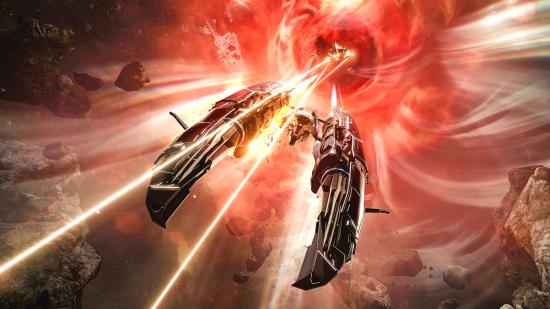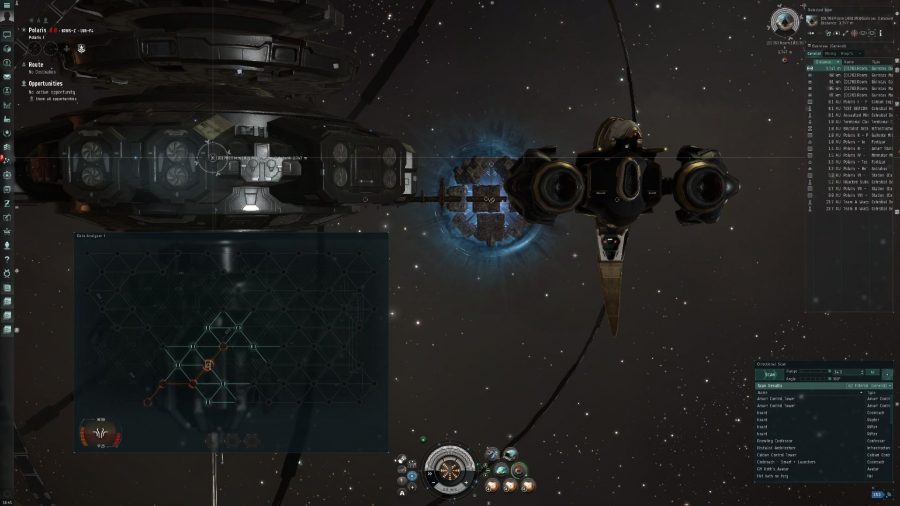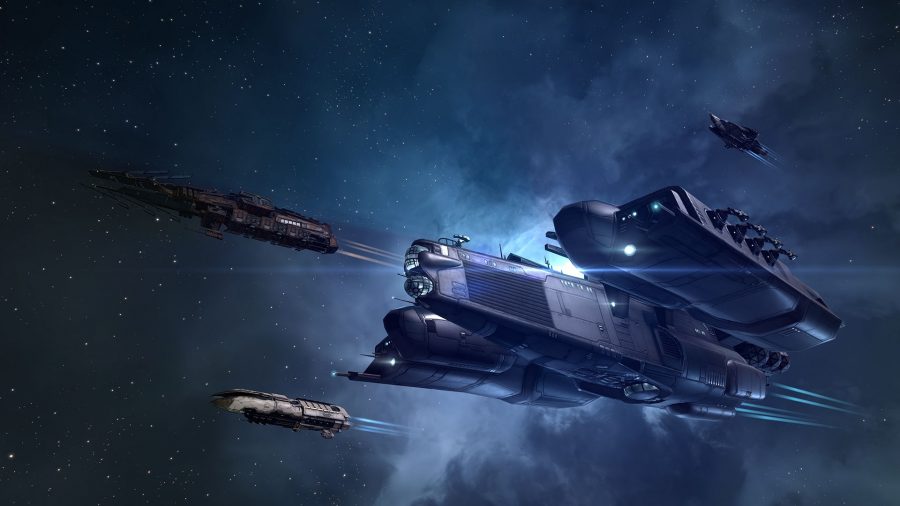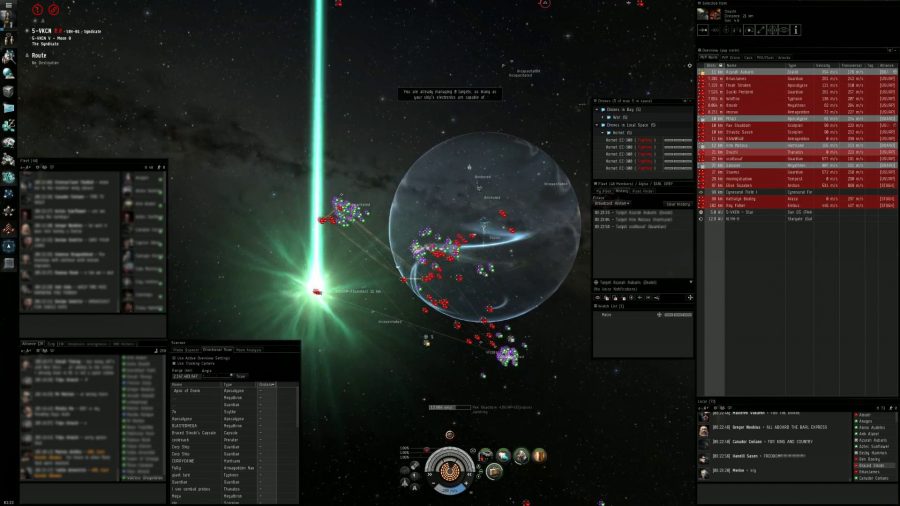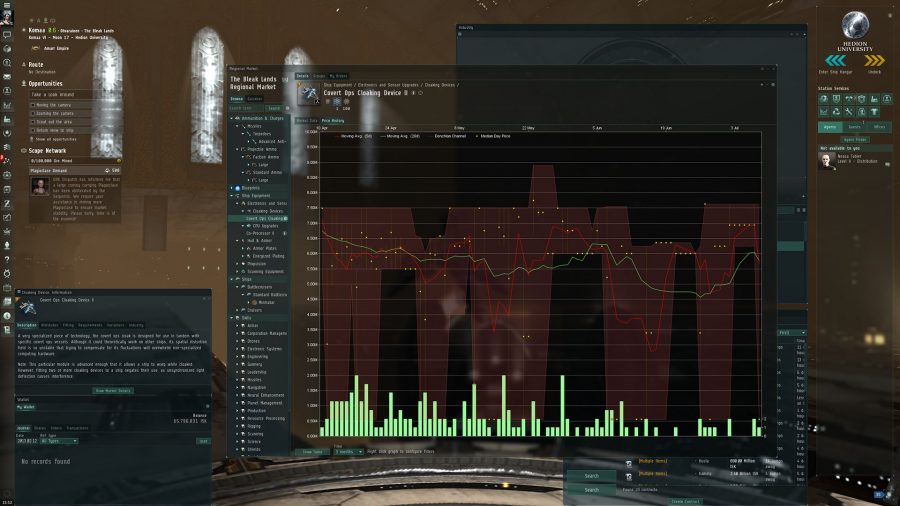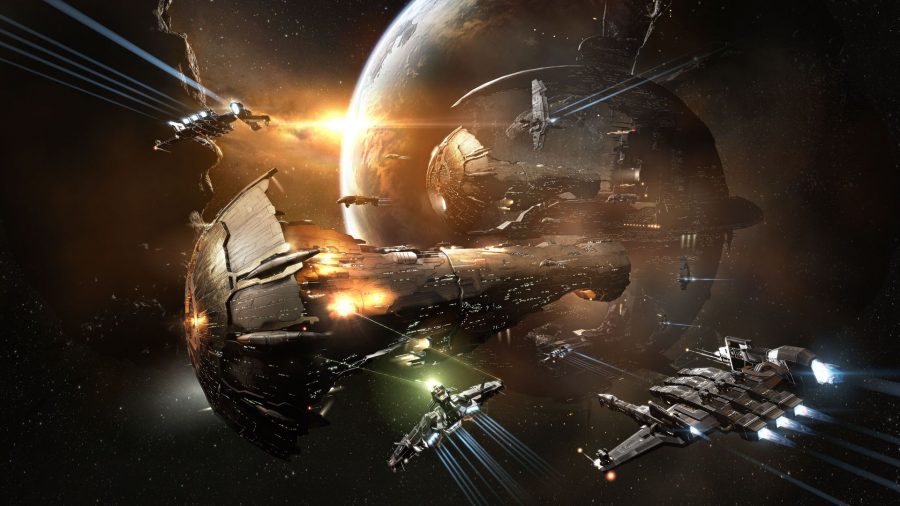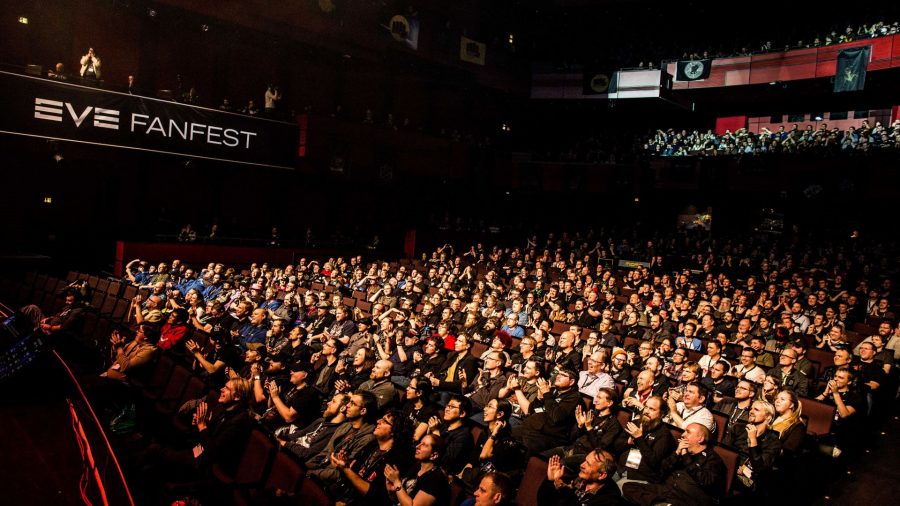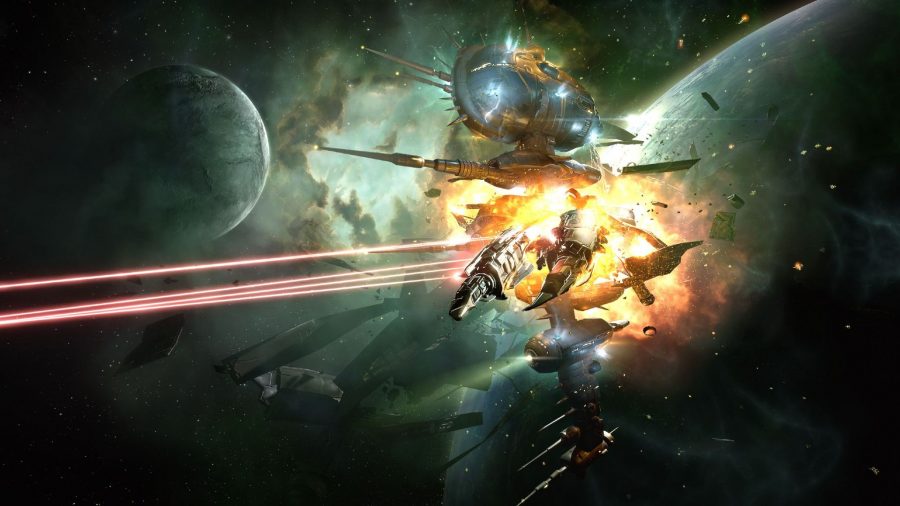When most of us hear about Eve Online, it’s because of some record-breaking battle that’s just annihilated an eye-watering amount of real-world value from the game. World War Bee 2 just set a new record with the Massacre at M2-XFE, which resulted in a combined loss of $378,012 (about £267,400) for the belligerents, who collectively destroyed some 3,404 ships – including 257 Titans, Eve’s largest and most expensive capital ships.
While the massive capital ships represent most of the actual value involved in Eve’s battles, the conflicts also demand huge amounts of time and dedication by vast numbers of players. The coalitions fighting the war – groups formed by Eve’s massive player-controlled corporations – need a steady stream of new recruits to maintain the war effort. They need fresh capsuleers, new players who are equipped with enough know-how to help battle enemy ships or act as scouts.
The problem is, Eve Online has a bit of a reputation for being difficult to get into. That initial difficulty curve is infamous, even among Eve players. A well-known cartoon among community members depicts a chart with the initial learning curves of MMOs like WoW and The Lord of the Rings Online, which appear to rise gently over time along the x-axis. High above them is a black line that represents Eve, which is depicted as a sheer cliff littered with the mangled bodies of players who have attempted to scale it and failed.
Developer CCP tells us that’s going to change. This year, says Eve creative director Bergur Finnbogason, smoothing out Eve’s onboarding process is a top priority. “We realised that this is not a single team’s problem,” Finnbogason says. “This is everyone’s problem at CCP. No fancy storyline will ever fix bad UI and UX. No wonderful UI will ever make a poorly written wall of text better.”
Finnbogason says that new players often “don’t stick” because they haven’t found a sense of purpose. Eve’s open-ended founding philosophy leaves new players without a traditional, guided narrative to follow, and so many struggle to find a primary goal to start working towards. CCP wants to fix that by providing more short- and medium-term goals for new players to latch onto, hoping these give them enough time in the universe to feel more at home.
But despite CCP’s intentions to smooth out the cliff new players face when they first start up Eve, there’s only so much the studio can do by adding new storylines and NPCs. The real determining factor for whether a new player abandons Eve after a few sessions or becomes a long-term player is Eve’s community is something the developers don’t directly control.
Moment of Truth
Eve Online’s current tutorial system takes you through the very basics of navigation and combat before setting you loose in a space station to take on jobs from some career counselor-type NPCs. Each career focuses on a particular element of Eve Online, such as mining, exploring, or hunting down and destroying space pirates. It’s pretty sedate and weirdly confusing, so it’s a point at which many new players wander off.
CCP hopes that taking a fresh look at the tutorial and onboarding process will help retain more new users. However, there’s only so much the developer can do, because there’s another, more important inflection point that almost always happens during a new capsuleer’s early career: their first devastating loss. How that happens, and what happens after, will determine whether or not a new player sticks around.
Tryggvi Hjaltason is CCP’s senior strategist, and has spent a lot of time thinking about how Eve players interact and what’s important to them. He says that the first major loss – usually the destruction of a ship the player has worked hard to earn – tends to split players into two groups.
“If a new player has a devastating moment early on, they will often leave,” he explains. But when Hjaltason asked players at Eve’s annual FanFest about what had prompted them to go from being casual Eve players to serious ones, he got a surprising answer – it was the same event. “They started telling me their stories, and a thread emerged quickly, which was that they had had a devastating event happen fairly early on in their journeys, too.”
Corporate Climate
Hjaltason quickly identified a couple clear indicators that helped predict whether that first significant loss would lead to a player leaving Eve or sticking around. Did the player understand the mistake they’d made or feel as though the death was fair? And did they feel as though they could rebuild from the loss, or had it wiped out everything they felt was valuable?
“The third, most important element in this was social connections,” Hjaltason tells us. “Do you have a shoulder to cry on? Do you have friends to share the loss with who can help you understand what went wrong? Who can give you hope to get back on your feet?”
The combination of these three factors – understanding, hope, and community – creates what CCP is calling ‘magic moments’, and its efforts to retain new players are focussed on engineering the conditions for these moments to occur naturally.
To do that, CCP needs the help of Eve’s complex array of player-controlled corporations. Eve’s corporations need a steady flow of new players as they’re what keeps its intergalactic battles ticking over. So, in many ways the corporations have taken over the job of welcoming new players and teaching them what Eve is all about.
“On a given week we tend to put fleets together of about 180 pilots at the largest,” explains YooJin Moon, who now serves as the director of education for a corporation known as Eve University. “For the most part, our corporation specialises in bringing new players into the game and teaching them the basics. Our mission is to push them out into other corporations, to get them experiencing the larger, wider game of Eve.”
Most established corporations in Eve have some kind of new player recruitment and training programme, some more elaborate and established than others. Induction into corporations is a different experience in each case, as new pilots aren’t just learning game mechanics – they’re also being introduced to an organisation’s distinctive culture.
“Recruitment can be a kind of insane process,” says Jessica ‘CCP Aurora’ Kenyon, an Eve veteran of more than 15 years who now works as a community developer. “It becomes almost like a forensic analysis of the person who’s playing. Is this person a good fit for our group? Do they swear at people all the time, because that can cause problems. So you care about that sort of stuff.”
Big alliances like Brave and the Imperium are always looking to recruit new players, but Kenyon says the organisations are large enough that there are often multiple tiers of membership and responsibility. Members who have spent some time with a corp may be chosen for bigger roles – alliances need teachers, administrators, and leaders. Moving into these positions can sometimes involve an Eve background check, with players in human resources roles sifting through applicants’ game histories and even social media posts.
“You need to start building a story for the person with all the available data that you have,” Kenyon says. “A lot of that is automated. You’ve got access to all of their data when they apply, so you go through their wallet, you go through all of their recent event logs.”
Kenyon says that at one point after she had taken a real-world class in forensic accounting, she went to give a talk to a group of recruiters in her Eve organisation about the difference between rough and round numbers – the kinds of things that can indicate manual versus automated transactions. It’s information recruiters can use to work out whether a potential new hire is working for an enemy corp and applying under false pretenses – corporate espionage is very real in Eve Online.
Many of Eve’s most important players go weeks or more without firing up the actual game client, but they’re still playing the game – sending emails, poring through logs, and planning their corporations’ next big moves.
“There are people in the alliances who are managing IT, and some of the IT things you see in Eve are ridiculous,” says Jinx D’ojo, who teaches classes for the Brave Collective’s educational department, the Brave Dojo. “Some of those people don’t log in, they haven’t logged in for years, but they stay connected to the communities and they make IT tools and all kinds of things, and that’s how they play Eve.”
Signing Bonus
Eve University maintains an academic neutrality in all of New Eden’s wars, but the corporations fighting those wars are eager to teach new pilots the ropes of the game, too. Using proprietary tools developed by players who are in many cases real-world software engineers, the big corps can use CCP’s API to scan for incoming players. Applications identify new accounts and make sure they’ve been approached within a certain amount of time after first firing up the Eve client.
There are plenty of good reasons to join. Corps are often ready to teach new players not only how to play, but also the nuances of Eve’s lingo. They have the resources to kit new players out with ships and fittings they’d never be able to afford at the outset. Most importantly, they provide that personal connection that keeps Eve players coming back, ready to invest their energy in a game with a thriving community.
“I always try to tell our new people, Eve is not a sprint – it’s a marathon,” says Ranger Gama, a real-world university professor who’s also a director in Eve’s Imperium alliance, as well as a tutor in its massive ‘Gooniversity’. “It takes some time to learn these mechanics, but you don’t have to beat your head against the wall. Let us help you, let us show you these little tricks. Let us give you these websites.”
Just as with corporate leadership, a lot of what happens in the rank and file takes place outside of the game client. New players are swiftly directed to community Discords, messageboards, and subreddits – just about everyone uses Eve University’s wiki, which is regarded by Eve educators as New Eden’s version of the Library of Alexandria.
Battle Ready
Given all of this, it may come as a surprise that training up a raw recruit to fight on the front lines of Eve’s major wars doesn’t take all that long. New pilots can prove invaluable, even when using some of the space game’s lowest-tier ships.
“A favourite story of all the KarmaFleet University guys is how my Titan died in the Massacre of M2,” says Broodin, a long-time KarmaFleet member who now heads up the group’s new educational wing. “It didn’t die because I got primaried by 400 enemy Titans. It died because one guy in a tech II frigate scrambled my ship and kept me from jumping to the panic cyno and getting away. I lost my Titan that day, which is one of the most powerful ships in the game, because of a newish player in a ship that only takes about two weeks in the game to get.”
Gobbins, the leader and founder of Pandemic Horde and an elected member of Eve’s Council of Stellar Management, says that the bigger the conflict, the easier it is for new players to get involved. “If you even just learn the basics of how the UI works, the very, very simple stuff that you can learn in an afternoon, you can be in one of those frigates, either jamming or locking down the enemy.”
It’s not hard to find a corp – there’s a recruitment centre set up on the official Eve forums and a subreddit dedicated to Eve jobs. Alternatively, you can just wait for them to come to you: within the first couple days of starting a new career, any new pilot will start receiving invites from corporations looking for new recruits.
The corporations almost all require voice communications while playing, and battle coordination is a big piece of why that’s the case. Those comms help new players understand why they’ve been directed to do a particular thing, but they also give those players a better sense of how they’re participating in a massive group effort. Feeling like you’re playing a meaningful part in a massive, coordinated effort is a powerful source of those ‘magic moments’ that keep people playing Eve.
Hjaltason has found more surprising insights about Eve’s community in his research. A staggering 73% of Eve players he surveyed said that they have made at least one real friendship through Eve, and of those, 65% said that these friendships have made a meaningful impact on their lives. The scale of the battles, and the real sense of loss at the destruction of a valuable ship, make Eve’s online interactions more intense than most, and Hjaltason says that’s rocket fuel for establishing long-lasting relationships.
“As it turns out, these are friendship-forging elements,” he says. “So I’ve started calling Eve a friendship machine. This is actually the primary reason I still work for this company: because I believe I’m contributing to a machine that is basically pumping out meaningful social connections in a world where that’s a dwindling asset.”
Even the machine itself is a relationship, one between CCP and Eve’s diverse community of players. It’s a relationship that Eve Online’s educators don’t want to see changed too drastically. Whatever CCP winds up doing with its reworked onboarding experience, teachers like Broodin caution that it can never be a comprehensive introduction to Eve. “Their new player experience needs to be focussed on connecting people and pushing that sense of community.”
